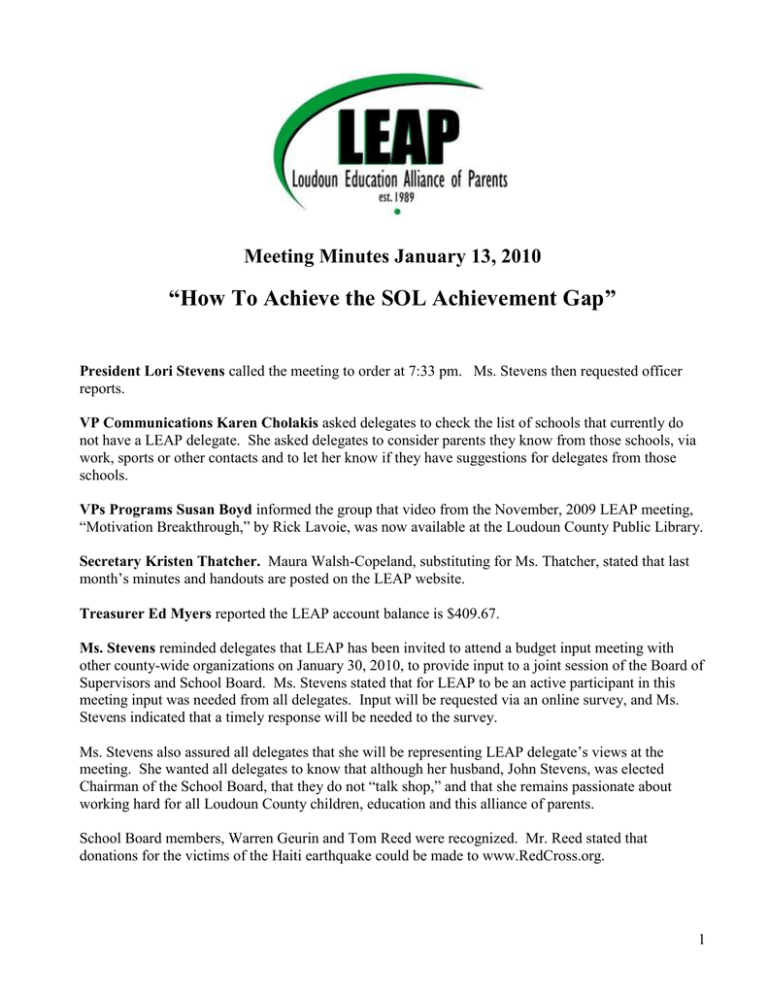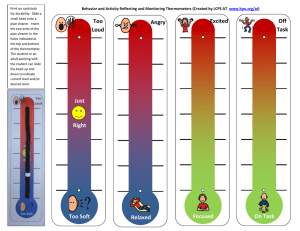“How To Achieve the SOL Achievement Gap”
advertisement

Meeting Minutes January 13, 2010 “How To Achieve the SOL Achievement Gap” President Lori Stevens called the meeting to order at 7:33 pm. Ms. Stevens then requested officer reports. VP Communications Karen Cholakis asked delegates to check the list of schools that currently do not have a LEAP delegate. She asked delegates to consider parents they know from those schools, via work, sports or other contacts and to let her know if they have suggestions for delegates from those schools. VPs Programs Susan Boyd informed the group that video from the November, 2009 LEAP meeting, “Motivation Breakthrough,” by Rick Lavoie, was now available at the Loudoun County Public Library. Secretary Kristen Thatcher. Maura Walsh-Copeland, substituting for Ms. Thatcher, stated that last month’s minutes and handouts are posted on the LEAP website. Treasurer Ed Myers reported the LEAP account balance is $409.67. Ms. Stevens reminded delegates that LEAP has been invited to attend a budget input meeting with other county-wide organizations on January 30, 2010, to provide input to a joint session of the Board of Supervisors and School Board. Ms. Stevens stated that for LEAP to be an active participant in this meeting input was needed from all delegates. Input will be requested via an online survey, and Ms. Stevens indicated that a timely response will be needed to the survey. Ms. Stevens also assured all delegates that she will be representing LEAP delegate’s views at the meeting. She wanted all delegates to know that although her husband, John Stevens, was elected Chairman of the School Board, that they do not “talk shop,” and that she remains passionate about working hard for all Loudoun County children, education and this alliance of parents. School Board members, Warren Geurin and Tom Reed were recognized. Mr. Reed stated that donations for the victims of the Haiti earthquake could be made to www.RedCross.org. 1 Ms. Stevens introduced the speakers for the program: Angela Robinson, Principal, Sugarland Run Elementary School, with Courtney Jones and Alexandra Wong, SIOP Resource Teachers for LCPS Sharon Ackerman, Assistant Superintendent for Instruction, LCPS Phyllis Randall, Chairperson, Minority Student Achievement Advisory Committee Angela Robinson, Principal, Sugarland Run Elementary School, with Courtney Jones and Alexandra Wong Ms. Robinson, Ms. Jones and Ms. Wong jointly presented, “SIOP, A Framework for Change.” The English Language Learner (ELL) student ratio has greatly increased from 1,193 students in 2001 to 5,191 students in 2009. The percentage of ELL students at Sugarland Run Elementary School is close to 19%. The presenters did a hands-on exercise, “What’s in an Apple?” with the group to demonstrate how “common experience” can improve the learning experience for ELL students. Interactive lessons create a concrete way to teach abstract concepts. [A description of the exercise can be found on the LEAP website.] After the exercise, the presenters explained “What is SIOP?” SIOP stands for “Sheltered Instruction Observation Protocol” developed by researchers and the Center for Applied Linguistics. SIOP is a framework for sound teaching and a way to organize lessons so that ALL students can learn effectively. SIOP lessons teach content objectives while supporting language development. A SIOP lesson has 8 components and thirty features. o Preparation o Building Background o Comprehensible Input o Strategies o Interaction o Practice/Application o Lesson Delivery o Review/Assessment SIOP provides a combination of “concept content” plus “support for academic English” to ELL students by providing visuals, gestures, adjusted speech, scaffolded lessons (layers of instruction), interaction, manipulatives and cooperative learning. The master design for the SIOP program includes: Master Schedule included common planning time for grade level teams and their specialists to meet weekly. Co-teaching became synonymous with SIOP. Ongoing, site-based, differentiated staff development opportunities were necessary to sustain the model over time. 2 SIOP Team established. The SIOP program was funded through Department of Instruction o ESL Department Funding SIOP Resource Teacher Grants Title 1 Funding SIOP changed the way Sugarland Run Elementary School educated ELL students. They share a common language that facilitates discussion across grade levels and specialty areas. They view effective instruction through the lens of the SIOP framework. They have a school-wide climate of shared responsibility and high expectations for all learners. The SIOP model has served as a unifying factor and a change agent for both teachers and students. They have Georgetown International Faculty visits each year. Training has expanded to other LCPS schools including Meadowland, Rolling Ridge, Leesburg, Balls Bluff, Countryside, and all elementary and Title I Reading teachers. LCPS Supervisor of English as a Second Language Al Evangelista, summarized the SIOP by saying it was the staff, not the system, that is makes students successful at Sugarland Run Elementary School. “A program doesn't change a school, a school changes itself.” Sharon Ackerman, Assistant Superintendent for Instruction, LCPS Ms. Ackerman presented the LCPS Department of Instruction’s views for “How to Close the Achievement Gap.” Eliminating the Achievement Gap School Climate and Culture requires the following: High expectations Equitable practices Access to rigorous curriculum Opportunities for student achievement and leadership Culturally competent staff and Effective, research-based curriculum and assessment practices Mrs. Ackerman informed the delegates that Loudoun County Public Schools exceed the State of Virginia’s On-Time Graduation Rate in all categories, with an overall on-time graduation rate of 93.7 percent. On-Time LCPS VA Graduation Rates Percent Percent Asian 96.3 93.3 African-American 92.5 75.7 Hispanic 79.4 72.3 White 96.3 87.0 Overall 93.7 83.2 3 Mrs. Ackerman explained that the Hispanic graduation rate is somewhat deceiving, due to the fact that many of these students graduate high school in more than four years after gaining the proficiency in English required to succeed in academic subjects. LCPS encourages each student to take at least one Advanced Placement (AP) course during their high school years to better understand what a college curriculum is like. LCPS students across all ethnicities continue to increase the percentage of LCPS students in grades 10 through 12 who took at least one Advanced Placement (AP) course, and 4 out of 5 ethnic groups increased the percent of achieving a “3” or higher on the AP exam, which may qualify a student for college level credit. Scholastic Achievement Test (SAT) scores are also higher for LCPS students than the state and national averages in all ethnic groups. Mrs. Ackerman provided the statistics for several other areas, which can be found on the LEAP website, meeting minutes handouts: 8th Grade Enrollment in Algebra I or Above Student Achievement: English Standards of Learning (SOL) Student Achievement: Mathematics SOL Comparison of LCPS and Virginia Gifted Program Enrollment Ethnicity Enrolled in Gifted Education Ms. Ackerman stated that the criteria to identify “gifted services” are not universal, and pointed out that AP courses could be considered “gifted services.” In addition, to achieve true equity, then LCPS would have the same percentage if gifted students across all ethnicities. As the charts presented showed, LCPS is coming closer to this goal. LCPS also provides Diversity Training for all Employees. The content of this training was developed by LCPS staff and national experts. Principals are trained to conduct session at each school, and special sessions are conducted for bus drivers, custodians, and maintenance workers. The LCPS Outreach Office also performs “Equity Audits” for Schools, checking schools for equitable: Expectations for students Teacher quality – Culturally responsive teaching Student participation Visual displays and library collections Effective use of data to meet students’ needs Fair and unbiased assessments Avoiding equity traps Ms. Ackerman described several programs available throughout various Loudoun County Public Schools: EDGE: Empowering Diversity in Gifted Education o Purpose: In the interest of improving student achievement, the purpose of this program is to provide additional academic challenges to economically, ethnically, and linguistically diverse students who exhibit gifted potential. 4 o Goals: 1. To develop high-level reasoning skills in students by employing a resource model. 2. To provide students with opportunities to enhance behaviors associated with high achievement, including: accepting responsibility, facing challenges, valuing the importance of achievement, and developing independence. 3. To actively involve parents as program partners. Preliminary Achievement Test (PSAT)/NMSQT. The PSAT/NMSQT is administered to all students in grades 9-11 at no cost to students. The PSAT helps students assess critical reading skills, math problem-solving skills, and writing skills. The most common reasons for taking the PSAT/NMSQT are to: o Receive feedback on the student’s strengths and weaknesses on skills necessary for college study. o Enter the competition for scholarships from NMSC (grade 11). o Help prepare for the SAT by becoming familiar with the kinds of questions and the exact directions on the SAT. o Receive information from colleges through the “Student Search Service” option. Advanced Placement courses. Why participate? Gain Skills that Will Help You Succeed in College o Get a head start on college-level work. o Improve your writing skills and sharpen your problem-solving techniques. o Develop the study habits necessary for tackling rigorous course work. o Broaden your intellectual horizons. o Be part of a community of students and educators who are passionate, curious, and committed to academic excellence. o Engage in intense discussions, solve problems collaboratively, and learn to write clearly and persuasively. CAMPUS Program o An academic and college preparation program designed to meet the specific needs of students from historically underrepresented groups in higher education and prospective first-generation college students. o Students commit to attending mandatory CAMPUS meetings and/or classes during the school day. o Parents are also an integral part and are expected to participate in CAMPUS initiatives and support their children in the college search and application process. Advancement Via Individual Determination (AVID) Program at Loudoun County HS & Park View HS o The mission of AVID is to ensure that all students, especially middle-performing students, will succeed in the most rigorous curriculum; enter the mainstream activities of the school; increase their enrollment in four-year colleges; and become educated, responsible participants and leaders in a democratic society. o AVID offers a rigorous program of instruction in academic “survival skills” and college level entry skills. Students participate in collaborative study groups or tutorials led by tutors who use skillful questioning to bring students to a higher level of understanding. 5 Role of Parent Liaisons in LCPS: o Facilitate parent-school communication; facilitate community agency referrals; encourage parent involvement in the school; foster trust between parents and the educational community; foster higher academic achievement through collaboration with school personnel. o The primary role of the Parent Liaison is to empower parents to become active participants in the education of their children. Targeted are those parents who need help in determining how best to help their children; are infrequent participants in school activities; may need clarification of their role in the educational process; need assistance in making connections and accessing services; associate schools with past negative experiences. Phyllis Randall, Chairperson, Minority Student Achievement Advisory Committee (MSAAC) MSAAC is a subcommittee of the LCPS School Board. Ms. Randall stated she has been pleased with Ms. Ackerman’s transparency with the information and statistics she presented, however, Ms. Randall indicated she’s still not pleased with the overall numbers themselves. Significant progress is being made to close the achievement gap, however Ms. Randall’s goal is for the gap to be eliminated. Ms. Randall said a “gap” often starts with teachers’ perceptions. She relayed a story about her own son who was not recommended for honors courses in middle school even though he earned straight A’s in 5th grade. Ms. Randall chose to overrule the recommendation, enrolled her son in several middle school honors classes, and he again earned straight A’s. This experience taught her: 1. Teachers sometimes have lowered standards for minority students; 2. Minority parents don’t’ know their own power to influence their student’s schedules, often influenced by their home country values and cultures; 3. A student cannot take an AP course in High School if he/she has not been prepared in elementary and middle schools for accelerated classes. The three main goals for MSAAC are: 1. Increase Parent Involvement among all parents, but with an emphasis on minority parents; 2. Continue to work with LCPS to eliminate (not close) the Academic and Discipline Achievement Gaps; and 3. Increase minority hiring levels in the LCPS System MSAAC has a number of “Goals in Action” which have been accepted by the Administration and School Board. These include: 1. Holding a full day work session held with the LCPS Administrative Staff 2. Make every effort to ensure that no child is racially isolated in a class room 3. MSAAC liaison to work with the LCPS Human Resources Dept. 4. Conduct a Parent Symposium 5. Write a Comprehensive Plan 6. Prepare a program book highlighting the program’s focus on minority students 7. Create a monthly newsletter to include direct communication and instructions for parent delegates 8. Attend the LCPS Leadership Training MSAAC holds its Parent Delegate meetings the third Wednesday of each month at 7:00pm at the LCPS Administration Building in the main board room. Executive Board Meetings are held the first Tuesday of the month at 7:00pm in the LCPS Administration Building in Room 101-D 6 Question and Answer Session: Q: [To Ms. Ackerman]: Who is the advocate (similar to MSAAC for minorities) for economically disadvantaged students? A: There is an overlap in minority groups, as seen with the Annual Yearly Progress (AYP) that demonstrates that students can be in more than one category or group. The Free and Reduced Lunch (FRL) group is highly confidential, so support is very quiet, handled one-on-one with student’s families and their teachers and principals. Q: How do you see the following three factors being improved in LCPS? 1. Parental involvement; 2. Community support; and 3. Instructional funding A: Ms. Randall: I’ve seen parental involvement making a huge difference, especially with parent liaisons. The increase in parental knowledge leads to increase in parental involvement. Even so, I’m no happy with the level of community support. A: Ms. Wong: “Parents as Education Partners” (PEP), available in nine schools, reaches out to parents and lets them know their power and how to be an effective partner. Working families can be involved just by showing interest in their student’s work. Volunteering in the school is not the only way. Q: To Randall: How bad is the discipline gap? A: The discipline gap stats were provided, but need to be used with caution. For example, a report of “7 discipline incidents” does not clearly indicate whether the causes were 1 child with 7 discipline incidents, or 7 children and 7 incidents. Q: Does the free breakfast program still exist? A: Yes, but breakfast is for ALL students, not only FRL students. Q: As an elementary school parent, I feel children are missing out because parents don’t understand because they have to have their children translate for them. Does LCPS have a program to work help students overcome cultural issues and their parents not getting involved? A: Newly arrived students do often bridge the gap as those being the ones learning English quickest. It’s better to focus on teachers, with parent liaisons taking the lead, rather than working through students to talk to their parents. LCPS has an extensive list of interpreters, capable of translating several hundred languages, who can be available for school meetings, functions and communication. LCPS Superintendent Dr. Hatrick: The FY2011 Operating Budget was presented to the School Board on January 12th. Overall, a “stay in place” budget was presented that does not take any programs away, but also does not expand any existing programs. The proposed budget reflects direction from the Loudoun County Board of Supervisors that the Proposed LCPS Operating Budgets reflect no more than a 5 percent increase in local funding. The proposed budget is 4.4 percent larger than this year's in anticipation of serving a student body that is projected to be 5.4 percent larger. 7 Highlights of the proposed $764.7 million budget include: $20 million to fund the needs generated by 3,257 new students and the opening of Tuscarora and Woodgrove high schools and Buffalo Trail Elementary. A savings of $7.4 million by increasing class size by one at all grade levels. (This will lead to the hiring of 100 fewer teachers.) A 1 percent cost of living adjustment (COLA) for all LCPS employees. Under the proposed budget, the average cost per pupil in Loudoun County drops to $11,683 from $11,997 in the current budget. If the Board of Supervisors require cuts to the proposed budget, an “Option 1” list of possible reductions has been compiled, which equates to meeting a 0% budget increase. A complete copy of Dr. Hatrick’s proposed budget can be found on the LCPS website. The LEAP meeting adjourned at 9:39 pm. Next Meeting: Wednesday, February 10, 2010, 7:30pm – Film for Thought – “Making Schools Work, with Hedrick Smith-KIPP Model” Submitted by Maura Walsh-Copeland for Kristen Thatcher 8




